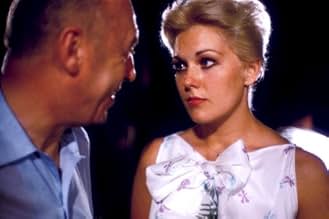IMDb रेटिंग
6.8/10
6 हज़ार
आपकी रेटिंग
अपनी भाषा में प्लॉट जोड़ेंSpoiled Cecile, 17, spends her summer at the French Riviera with her rich, widower, playboy dad and Elsa. Anne, her late mom's friend, visits and brings changes to all.Spoiled Cecile, 17, spends her summer at the French Riviera with her rich, widower, playboy dad and Elsa. Anne, her late mom's friend, visits and brings changes to all.Spoiled Cecile, 17, spends her summer at the French Riviera with her rich, widower, playboy dad and Elsa. Anne, her late mom's friend, visits and brings changes to all.
- 1 BAFTA अवार्ड के लिए नामांकित
- 2 कुल नामांकन
Tutte Lemkow
- Pierre Schube
- (बिना क्रेडिट के)
Maryse Martin
- Undetermined Secondary Role
- (बिना क्रेडिट के)
Edouard F. Médard
- Bit part
- (बिना क्रेडिट के)
Jackie Raynal
- Dancer
- (बिना क्रेडिट के)
फ़ीचर्ड समीक्षाएं
A good-for-nothing, unhappy high society girl recalls a summer when she destroyed the love of her rich playboy father and his respectable bride, because she was afraid of finishing their hedonistic lifestyle.
Well-acted, starry cast and very graciously made but, in atmosphere, oddly faithless adaptation of a sharply cynical novel, which tends to glamorize and ennoble its originally unlovable characters against luxurious backgrounds. It holds the interest, however, and the glossily colorful photography of the sunlit French Rivera in the past alternating with the bleakly black and white present, is particularly excellent.
Well-acted, starry cast and very graciously made but, in atmosphere, oddly faithless adaptation of a sharply cynical novel, which tends to glamorize and ennoble its originally unlovable characters against luxurious backgrounds. It holds the interest, however, and the glossily colorful photography of the sunlit French Rivera in the past alternating with the bleakly black and white present, is particularly excellent.
A fascinating, frustrating, though ultimately deeply satisfying film. Many readers have commented on the frustrations, and they are hard to deny. My experience of this movie goes back to the early 70s, when I first encountered it in ideal circumstances, at the Museum of Modern Art during its complete Preminger retrospective, and in a gorgeous, perfect print. A great introduction to a film whose very meaning resides in its glossy surface. The first few minutes of the film powerfully set up the tragedy that is to come: Saul Bass's dripping teardrop titles underscored with Auric's deeply tragic music, followed by the first black and white scenes depicting Cecile's current active but deeply disengaged life. Then, as Cecile arrives home and begins remembering "last summer", the blue Mediterranean sea begins to invade the frame, little by little -- a striking effect, to say the least --, we are there, in the midst of a carefree vacation with Cecile, Raymond and Elsa, and quite successfully invited to forget the tragedy that seems to be in the making and enter a carefree, sunlit world where nothing, seemingly, could ever go wrong. Masterful film-making, and, thus far, perfectly pitched: Seberg's perfectly expressionless and beautiful face has no small part in making it work. That she is less secure in the flashback scenes is unfortunate, but her physical presence at least gives the right signs: this is a very young girl, happy but extremely shallow. (Yes, I will admit that the line readings are quite stiff -- no question she is "acting." But, if one is already in the proper frame of mind they are not all that damaging.) What's important is the holiday mood, and the performances of Niven and Mylene Demongeot are sufficiently effervescent to evoke it. (Demongeot is a real charmer -- beautiful beyond belief and full of joie de vivre.) The arrival of Deborah Kerr on the scene changes all this: a dignified Lady coming into the midst of a world she finds immoral, distasteful and, in the deepest sense, unacceptable: her reaction to realizing that Raymond is, shall we say, shacking up with Elsa is the turning point of the film, the crossroads of comedy and tragedy. And from this point we are invited to see how, step by step, comedy turns to tragedy. What's most wonderful about this film is how diverting that progression is. The world of the French Riviera is, after all, a world of carefree bliss (at least on the surface), and we are given ample opportunity to enjoy that along with the characters in the film: a delightful casino scene (enlivened by the presence of that wonderful actor, Walter Chiari, a truly handsome man with a wonderful flair for comedy, and here, playing opposite Demongeot, particularly delightful) and a visually stunning dance at the dock, a masterpiece of costume design in delicious color and Cinemascope, worthy of a Minnelli musical (and, in its delirious scale, surpassing most of them). Finally, let me just say that the final moments of the film (and I will refrain from spoiling them) are among the most moving in all cinema: an evocation of self-loathing and emptiness that remains unrivaled in its beauty. Yes, beauty. Caveat emptor: It is useless to see this film in the pan&scan version (I have had the experience, and it is horrible). The Columbia DVD edition looks great (absolutely NO extras, by the way; it appears to have been simply dumped on the market -- odd treatment of a masterpiece). Oh, yes, my title heading: Preminger's previous films had mostly dealt with "little" events -- noirs, small comedies, etc.; most of his subsequent films ("Exodus," "The Cardinal," "Advise and Consent," "In Harms Way") with Big Events. This one is still on an intimate scale, but has much in common visually (particularly the masterful use of CinemaScope, to which Preminger took like a fish to water) with the later films.
Film makers love to show off the Rivera, and for good reason. It's one of the most spectacular venues in the world. However, it's interesting to compare Preminger's Rivera with those of Hitchcock in "To Catch a Thief" and Powell's in "The Red Shoes". In "The Red Shoes" the Riviera is merely a setting in which artists work obsessively to create their art while paying virtually no attention to it. For Hitchcock, the Riviera is a lush background for intrigue. In Preminger's "Bonjour Tristesse" the Riviera represents the lifestyle that the characters desire; luxurious, sensual, hedonistic and, ultimately, empty. "Bonjour Tristesse" is worth seeing for the Riviera, which looks fabulous, and Jean Seberg, who looks fabulous. However, the story is as shallow as the characters.
I do not think that it would be giving away the plot to say that the viewer is led to believe from the very beginning that he is seeing a tragedy. After all, the title translates as "Hello, Sorrow". Furthermore, the opening exposition, filmed in somber black-and-white, leads one to believe that the lives of the protagonists have been devastated by some great tragedy. However, from the very beginning it is also obvious that this impression is not true at all. The father and daughter are depicted as a pair of shallow, selfish, hedonists who care nothing for anything or anyone beyond each other and their own immediate gratification.
The story does not even mention exactly what, if anything, it is that the father does for a living. He is obviously extremely wealthy, but is never seen to do any sort of work or transact any business. It was apparently sufficient for the author that he should be nothing more than a rich, idle, middle-aged playboy who changes his cars as frequently as his daughter, who never wears the same outfit twice, changes her clothes.
In short, not only are the characters in this story not real people, they are not even sympathetic unreal people. It's bad enough having to put up with an hour and a half movie about mannequins without them having to be unlikable mannequins.
I do not think that it would be giving away the plot to say that the viewer is led to believe from the very beginning that he is seeing a tragedy. After all, the title translates as "Hello, Sorrow". Furthermore, the opening exposition, filmed in somber black-and-white, leads one to believe that the lives of the protagonists have been devastated by some great tragedy. However, from the very beginning it is also obvious that this impression is not true at all. The father and daughter are depicted as a pair of shallow, selfish, hedonists who care nothing for anything or anyone beyond each other and their own immediate gratification.
The story does not even mention exactly what, if anything, it is that the father does for a living. He is obviously extremely wealthy, but is never seen to do any sort of work or transact any business. It was apparently sufficient for the author that he should be nothing more than a rich, idle, middle-aged playboy who changes his cars as frequently as his daughter, who never wears the same outfit twice, changes her clothes.
In short, not only are the characters in this story not real people, they are not even sympathetic unreal people. It's bad enough having to put up with an hour and a half movie about mannequins without them having to be unlikable mannequins.
Jean Seberg is an absolute joy. I just wanna give her a big fat hug and kiss... well that's just two things anyway. What makes Otto Preminger's film so wonderful is that Seberg is the right age to play the part of a spoiled rich girl coming of age. Also the film is given an authenticity and heart because it was written by Françoise Sagan when she was the same age as Cecile (Seberg). That's right, this amazing and brilliant work was penned by a 17-year old.
The plot is fairly standard. A young girl living with her playboy father becomes jealous of his new love and when marriage is proposed she does her best to break it up. Gee nothing remarkable there. What is remarkable is the characters and their relationships. They have an extra amount of depth and the situation between Cecile and her father, Raymond (David Niven) borders on the incestuous. This gives it an added dimension and depth when Anne (Deborah Kerr) threatens to "steal" her father away. Another place where it avoids clichés is dealing with Anne. Kerr plays her magnificently and with a warm passion. She is not the wicked step mother here, but a sympathetic and self sacrificing woman who wants to bring love and stability into Cecile and Raymond's morally ambiguous and flighty lifestyle. This film while a modest success in America was a huge hit in Europe and inspired Jean-Luc Godard to work with Seberg.
Bonjour Tristesse also foreshadowed the films dealing with the idle rich that quickly popped up in its wake including two masterpieces, Antonioni's L'avventura and Fellini's La Dolce Vita. Preminger directs Bonjour Tristesse with a sure hand and I love how the flashbacks are in color and the present day scenes are in a somber black and white to fit with the mood. Oh and yes the story is told in flashback for the most part and the technique along with Seberg's narration gives a heightened sense of loss that Cecile and Raymond feel towards the events that transpired concerning Anne. Remarkable film and Seberg is so delightful and hot running around in her bathing suit practically the whole time.
Grade: A
The plot is fairly standard. A young girl living with her playboy father becomes jealous of his new love and when marriage is proposed she does her best to break it up. Gee nothing remarkable there. What is remarkable is the characters and their relationships. They have an extra amount of depth and the situation between Cecile and her father, Raymond (David Niven) borders on the incestuous. This gives it an added dimension and depth when Anne (Deborah Kerr) threatens to "steal" her father away. Another place where it avoids clichés is dealing with Anne. Kerr plays her magnificently and with a warm passion. She is not the wicked step mother here, but a sympathetic and self sacrificing woman who wants to bring love and stability into Cecile and Raymond's morally ambiguous and flighty lifestyle. This film while a modest success in America was a huge hit in Europe and inspired Jean-Luc Godard to work with Seberg.
Bonjour Tristesse also foreshadowed the films dealing with the idle rich that quickly popped up in its wake including two masterpieces, Antonioni's L'avventura and Fellini's La Dolce Vita. Preminger directs Bonjour Tristesse with a sure hand and I love how the flashbacks are in color and the present day scenes are in a somber black and white to fit with the mood. Oh and yes the story is told in flashback for the most part and the technique along with Seberg's narration gives a heightened sense of loss that Cecile and Raymond feel towards the events that transpired concerning Anne. Remarkable film and Seberg is so delightful and hot running around in her bathing suit practically the whole time.
Grade: A
Reviews of this film are more interesting and thought provoking than most. A number of them convey critical insights that certainly deepened my appreciation. Yes, the film is flawed, but it also resonates beyond standard soap opera mainly because of its tragic central premise. That the movie doesn't fully realize its aim, I'm sorry to say, is largely because of limitations in Seberg's performance. I agree, she's a lively and compelling screen presence with a freshness that's genuinely appealing. However, the role of Cecile calls upon more emotional depth than Seberg manages to convey, especially with the absence of troubled emotions. Thus the sense of tragic outcome stems from sources other than Seberg's performance. Now, there are several ways of looking at Cecile's emotional make-up and maturity, but there's one I believe that most strongly recommends itself and also puts Seberg's performance in the best light.
On this view, Seberg has Cecile's character just right during the sunny Technicolor phase. Cecile is simply too immature to realize the potential consequences of her scheming actions. Thus, Cecile (Seberg) attaches no more gravity to breaking up her father's relationship than she does to skipping her studies. She's all spoiled selfishness wrapped in a winsome smile. And it's not until the car crash that she realizes the consequences of her selfish act, and experiences an emotional depth for the first time. Her scheme thus results not from making a wrongful choice but from not even realizing that a choice is being made. This view would vindicate nine-tenths of Seberg's unconflicted Technicolor performance, but not the black- and-white phase where Seberg fails to convey the conflict required. This view would also explain the added features of narration, color change and Saul Bass graphics once Preminger realizes that Seberg's performance is not enough to convey the necessary sense of tragedy.
Despite this central flaw, the movie remains oddly haunting. Maybe it's because of a sun- washed paradise so carelessly lost, or of a summer of such promise turned into a lifetime of regret. I really like the observation that father and daughter behave as though actions have no consequences. As a result, their humanity is only realized once the importance of this lesson is tragically driven home. Only by then, it's too late. In my view, the movie remains regrettably underrated.
On this view, Seberg has Cecile's character just right during the sunny Technicolor phase. Cecile is simply too immature to realize the potential consequences of her scheming actions. Thus, Cecile (Seberg) attaches no more gravity to breaking up her father's relationship than she does to skipping her studies. She's all spoiled selfishness wrapped in a winsome smile. And it's not until the car crash that she realizes the consequences of her selfish act, and experiences an emotional depth for the first time. Her scheme thus results not from making a wrongful choice but from not even realizing that a choice is being made. This view would vindicate nine-tenths of Seberg's unconflicted Technicolor performance, but not the black- and-white phase where Seberg fails to convey the conflict required. This view would also explain the added features of narration, color change and Saul Bass graphics once Preminger realizes that Seberg's performance is not enough to convey the necessary sense of tragedy.
Despite this central flaw, the movie remains oddly haunting. Maybe it's because of a sun- washed paradise so carelessly lost, or of a summer of such promise turned into a lifetime of regret. I really like the observation that father and daughter behave as though actions have no consequences. As a result, their humanity is only realized once the importance of this lesson is tragically driven home. Only by then, it's too late. In my view, the movie remains regrettably underrated.
क्या आपको पता है
- ट्रिवियाOtto Preminger always liked this film, although he felt the American critics did not do it justice. The film was a qualified success in France, yet American critics felt the film wasn't French enough, a detail that amused Preminger.
- गूफ़We hear the Band at c.6'50" and we see a clarinet-player performing, but the music has no clarinet part whatsoever included at that point in the soundtrack. Later, when the clarinet does eventually join the soundtrack, the fingering of the player bears absolutely no relation to the music actually being heard.
- कनेक्शनEdited into Histoire(s) du cinéma: Une histoire seule (1989)
टॉप पसंद
रेटिंग देने के लिए साइन-इन करें और वैयक्तिकृत सुझावों के लिए वॉचलिस्ट करें
विवरण
बॉक्स ऑफ़िस
- दुनिया भर में सकल
- $446
- चलने की अवधि1 घंटा 34 मिनट
- रंग
- पक्ष अनुपात
- 2.35 : 1
इस पेज में योगदान दें
किसी बदलाव का सुझाव दें या अनुपलब्ध कॉन्टेंट जोड़ें




































